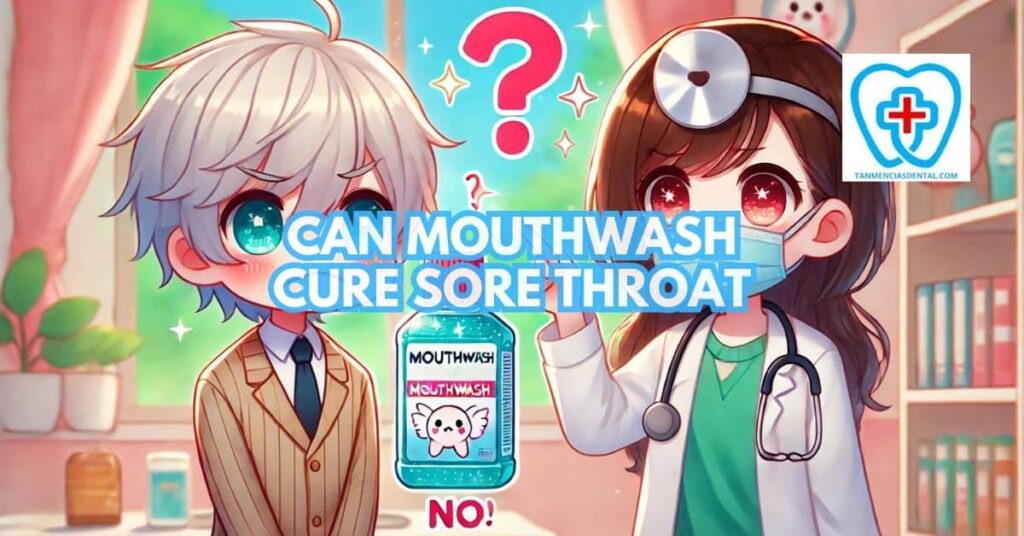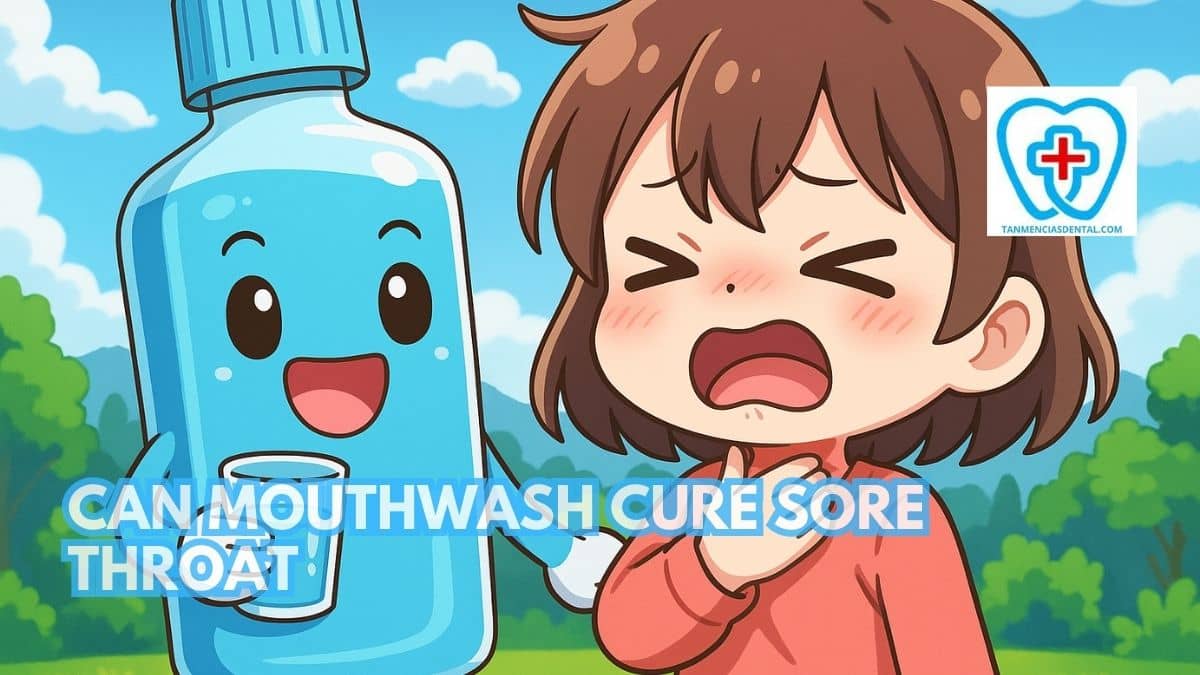Many people ask the question, Can mouthwash cure sore throat, but the answer is not as simple as it seems.
Mouthwash helps keep the mouth clean and fresh, yet its role in easing throat pain is often misunderstood.
Some ingredients may bring short-term comfort, while others can irritate the throat and make symptoms worse.
It is important to know what mouthwash can and cannot do, so you do not rely on it as a full treatment.
We’ll look at the facts, clear up common myths, and explain better ways to care for a sore throat.
1. Sore Throat SOS: Mouthwash Myth Busted!
Many believe that mouthwash can cure a sore throat, but this belief is not supported by medical evidence.
Mouthwash can provide temporary relief, making the throat feel better for a short period of time, but it doesn’t address the root cause of the soreness.
Sore throats are typically caused by viral infections, such as the common cold or flu, which mouthwash cannot cure.
Instead of relying on mouthwash, it’s often more effective to gargle salt water, which can help a sore throat by reducing inflammation and killing bacteria.
Additionally, overuse of mouthwash can sometimes irritate the throat further, especially if it contains alcohol.
It’s crucial to understand that while mouthwash can be a helpful tool for oral hygiene, it’s not a solution for sore throats.
For longer-lasting relief, consider other methods like warm water rinses or staying hydrated.
🦷 Brushing Away Trouble: Best Toothpaste for Plaque and Gingivitis
2. Temporary Relief: Can Mouthwash Soothe Your Scratchy Throat?
Mouthwash can offer a cooling and numbing sensation that may soothe a scratchy throat temporarily.
Ingredients like menthol and eucalyptol in some mouthwashes provide this effect.
However, this relief is often short-lived and doesn’t tackle the underlying cause of the throat irritation.
For more lasting relief, consider using home remedies like warm saltwater gargles or honey.
These methods can provide comfort and support healing in a more effective way than mouthwash alone.
🦷 Brushing with Confidence: Are Electric Toothbrushes Safe for Kids and Adults?
3. Beyond Bacteria: Why Mouthwash Isn’t Your Sore Throat Savior
While mouthwash is excellent at killing bacteria in the mouth, it falls short when dealing with sore throats caused by viruses.
Most sore throats are viral in nature, meaning that antibacterial mouthwash won’t eliminate the root cause.
Moreover, some sore throats result from irritation due to allergies or dry air, which mouthwash can’t remedy.
Understanding the difference between bacterial and viral infections is key to treating a sore throat properly.
Relying solely on mouthwash might lead to neglecting more effective treatments and prolonging discomfort.
🦷 Can Electric Toothbrushes Damage Fillings? Brushing for a Smile, Not a Disaster
4. Antiseptic Showdown: Different Mouthwashes and Their Impact
Not all mouthwashes are created equal; different formulations have varied impacts on oral health and throat comfort.
Antiseptic mouthwashes contain ingredients like chlorhexidine or cetylpyridinium chloride, which can reduce bacteria in the mouth.
These can help in cases where the sore throat is due to a bacterial infection, but they won’t cure viral infections.
Some mouthwashes focus on freshening breath with ingredients like menthol, providing a temporary cooling effect.
Knowing the purpose and ingredients of your mouthwash can help you choose the right one for your needs.
🦷 Brushing BFF or Brushing Blocker? The Truth About Mouthwash Before Brushing Teeth

5. Alcohol-Free vs Alcohol-Based Mouthwashes: Which Is Gentler on a Sore Throat
Alcohol-based mouthwashes can sometimes cause a burning feeling and make a sore throat feel worse.
Alcohol-free mouthwashes are usually gentler and less likely to dry out the throat.
People with throat irritation often choose alcohol-free options for more comfort.
Both types can help with oral hygiene, but neither can cure the cause of a sore throat.
Knowing the difference helps you pick the type that will ease symptoms without adding more discomfort.
🦷 Why Understanding Dentist Vs Oral Surgeon Roles Matters for Your Oral Health
6. Numbing Power: How Mouthwash Can Offer Short-Term Relief
Certain mouthwashes contain numbing agents that can temporarily alleviate throat pain.
Ingredients such as menthol, alcohol, and eucalyptol can create a cooling and numbing sensation.
This can make swallowing less painful for a short time, providing a brief respite from discomfort.
However, this effect is not long-lasting, and repeated use can sometimes cause irritation.
It’s important to use these mouthwashes as part of a broader strategy for managing sore throat symptoms.
🦷 Is Your Smile Worth It? Why Dental Care Is So Expensive
7. Finding Real Relief: Best Home Remedies for Sore Throats
For more sustained relief from a sore throat, home remedies can be highly effective.
Warm saltwater gargles help reduce swelling and kill bacteria in the throat.
Honey has natural antibacterial properties and can soothe the throat when mixed with tea or taken by the spoonful.
Herbal teas, such as chamomile or peppermint, can also provide comfort and reduce inflammation.
These treatments can add to the short-term relief that mouthwash offers by providing a more comprehensive approach to care.
🦷 Does Salt Water Help With Gingivitis? The Salty Truth About Gum Relief
8. Myth Buster: Debunking Common Mouthwash Misconceptions
A common misconception is that mouthwash can completely cure a sore throat, but this is not accurate.
Mouthwash is designed primarily for oral hygiene, not for treating throat infections.
Another myth is that using mouthwash frequently can prevent all types of sore throats, whereas it mainly targets oral bacteria.
Some believe that all mouthwashes are the same, but different formulations serve different purposes.
Understanding these misconceptions can help you use mouthwash more effectively and avoid over-reliance on it for throat issues.
🦷 Can You Drink Sparkling Water After Brushing Your Teeth?
9. Prevention is Key: Good Oral Hygiene and Avoiding Sore Throats
Maintaining good oral hygiene is crucial to preventing sore throats, especially those caused by bacterial infections.
Regular brushing and flossing remove food particles and plaque, reducing the chance of bacterial growth.
Using mouthwash as part of your routine can help keep bacteria at bay, but it should be alcohol-free to avoid throat irritation.
Staying hydrated and avoiding irritants like smoke can also help keep your throat healthy.
These preventive measures can significantly reduce the frequency and severity of sore throats.
🦷 Why Be a Dental Assistant? It’s More Than Just Smiles!
10. When to See a Doctor: Recognizing Signs of a More Serious Issue
It’s essential to know when a sore throat requires professional medical attention.
See a doctor if your sore throat persists for more than a week, is associated with a high fever, or makes it difficult to breathe or swallow.
These symptoms could indicate a more serious condition, such as strep throat or tonsillitis, which mouthwash and home remedies can’t cure.
Early diagnosis and treatment can prevent complications and lead to a quicker recovery.
Don’t hesitate to seek medical help if you notice these warning signs.
🦷 Advance Dental Health Program in Marikina
11. Share Your Tips! Favorite Home Remedies and Mouthwash Experiences
Many people have their own tried-and-true methods for dealing with sore throats.
Sharing your experiences with different home remedies and mouthwashes can provide valuable insights for others.
Whether it’s a specific herbal tea blend, a unique honey mixture, or a particular brand of mouthwash that works best for you, your tips can help someone else find relief.
Community knowledge can be a powerful tool in managing common ailments like sore throats.
Feel free to share and learn from others to improve your sore throat management strategies.
🦷 Highly Qualified Dentists in Marikina City
👨⚕️ Conclusion
While mouthwash can offer temporary relief for a sore throat, it should not be relied upon as a cure.
Understanding its limitations and combining it with other effective remedies can provide better results.
Home remedies, good oral hygiene, and knowing when to seek medical help are all important components of sore throat care.
By using a comprehensive approach, you can manage symptoms more effectively and find lasting relief.
Always consult a healthcare provider for persistent or severe sore throat symptoms.
😊 Self-Promotion
Visit Tan-Mencias Dental Clinic in Parang, Marikina City, for all your dental care needs.
Our friendly and professional team is dedicated to providing top-quality services to keep your smile healthy and bright.
For any questions or concerns, you can call us at 9171451074, send a message through our Facebook page, or use our website’s contact form.
We are here to help, and we look forward to serving you.
Experience excellent dental care in a welcoming environment today!
❔ FAQs
1. Can mouthwash cure sore throat?
No, mouthwash cannot cure a sore throat.
It may give short-term relief by numbing or cooling the throat, but it does not treat the cause.
Most sore throats are caused by viruses, which mouthwash cannot eliminate.
2. Is it safe to use mouthwash when I have a sore throat?
Yes, it is generally safe, but some mouthwashes with alcohol may sting or dry out the throat.
Choosing an alcohol-free option can be gentler.
If irritation gets worse, stop using it and try other remedies.
3. What type of mouthwash is better for a sore throat?
Alcohol-free mouthwash is usually better because it does not cause burning or dryness.
Some types may contain soothing ingredients like menthol.
They can make the throat feel calmer, but they still do not cure the illness.
4. What are better home remedies for sore throats than mouthwash?
Warm salt water gargles, honey, and herbal teas like chamomile or peppermint can ease discomfort.
These methods help reduce swelling and coat the throat.
They often give more lasting relief than mouthwash.
5. When should I see a doctor for a sore throat?
You should see a doctor if your sore throat lasts more than a week, comes with a high fever, or makes it hard to swallow or breathe.
These may be signs of infections like strep throat or tonsillitis.
A doctor can check the cause and give the right treatment.

